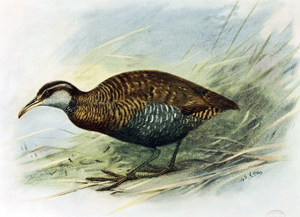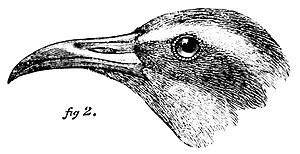Dieffenbach's rail facts for kids
Quick facts for kids Dieffenbach's rail |
|
|---|---|
 |
|
| Conservation status | |
| Scientific classification |
|
| Kingdom: | Animalia |
| Phylum: | Chordata |
| Class: | Aves |
| Order: | Gruiformes |
| Family: | Rallidae |
| Genus: | Hypotaenidia |
| Species: |
†H. dieffenbachii
|
| Binomial name | |
| †Hypotaenidia dieffenbachii (Gray, 1843)
|
|
| Script error: The function "autoWithCaption" does not exist. | |
| Synonyms | |
|
Hypotaenidia dieffenbachii (Gray, 1843) |
|
Script error: No such module "Check for conflicting parameters".
The Dieffenbach's rail (Hypotaenidia dieffenbachii) was a type of bird that is now extinct. This means there are no more of these birds alive today. It belonged to the Rallidae family, which includes rails, crakes, and coots.
This bird was flightless, meaning it could not fly. It lived only on the Chatham Islands, a group of islands in the Pacific Ocean. When a species lives only in one specific place, it is called endemic. The native people of the Chatham Islands, the Moriori, called this bird meriki or mehoriki.
The only time a living Dieffenbach's rail was recorded was in 1840. It was captured by a scientist named Ernst Dieffenbach. The bird was named after him to honor his discovery. Sadly, the Dieffenbach's rail became extinct not long after 1840. This happened because people hunted them, and new animals brought to the islands (like rats or cats) also hunted them.
How Was It Related to Other Birds?
The Dieffenbach's rail lived in the same area as another flightless bird, the Chatham rail. Scientists first thought these two birds were very closely related. They believed both birds might have evolved from a common flying ancestor, perhaps the buff-banded rail (Hypotaenidia philippensis).
However, a study in 2014 looked at the genes of these birds. This research showed that the Dieffenbach's rail and the Chatham rail were not as closely related as once thought. The Dieffenbach's rail was found to be more closely related to the group of birds that includes the Buff-banded rail.
Images for kids
See also
 In Spanish: Rascón de Dieffenbach para niños
In Spanish: Rascón de Dieffenbach para niños
 | John T. Biggers |
 | Thomas Blackshear |
 | Mark Bradford |
 | Beverly Buchanan |








